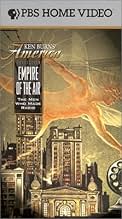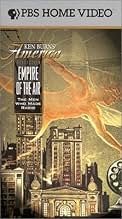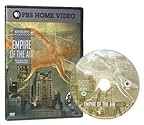VALUTAZIONE IMDb
7,5/10
646
LA TUA VALUTAZIONE
Aggiungi una trama nella tua linguaFor 50 years, radio dominated the airwaves as the first mass medium. Ken Burns examines the lives of three men who shared the responsibility for its invention and early success.For 50 years, radio dominated the airwaves as the first mass medium. Ken Burns examines the lives of three men who shared the responsibility for its invention and early success.For 50 years, radio dominated the airwaves as the first mass medium. Ken Burns examines the lives of three men who shared the responsibility for its invention and early success.
- Regia
- Sceneggiatura
- Star
- Candidato a 1 Primetime Emmy
- 2 candidature totali
Jason Robards
- Narrator
- (voce)
Fred Allen
- Self - Predicts Demise of Radio
- (filmato d'archivio)
- (non citato nei titoli originali)
Gene Autry
- Self - Sings
- (audio di repertorio)
- (non citato nei titoli originali)
John Barrymore
- Hamlet
- (audio di repertorio)
- (non citato nei titoli originali)
Winston Churchill
- Self - Finest Hour Speech
- (audio di repertorio)
- (non citato nei titoli originali)
Recensioni in evidenza
4yce4
The Guglielmo Marconi Case Who is the True Inventor of Radio?
How many mistakes are there in our history books after all? How many facts are erroneously described and so replicated throughout the world, while the reality is completely different?
The invention of radio is one of these cases. Despite the fact that almost every book mentions Guglielmo Marconi as the inventor of radio, the only thing Marconi did seems to be nothing more than reproducing apparatus Nikola Tesla had registered years ago. Marconi copied Tesla, made some modifications, built a large industry producing radio devices in Europe and spent huge amounts to advertise his supposed invention.
Yet, the inventor of radio is Nikola Tesla, as proved by official court decisions and as great scientists of his era admit.
The Facts
1893 Tesla carries his first experiments with high frequency electric currents. The first demonstration of wireless communication. In his articles and lectures Tesla describes his first radio apparatus in detail.
1895 Marconi presents a radio device in London, claiming it as his invention. However, the device is the same as what Tesla had already described in his articles. Later on, Marconi will claim that he had not read Tesla's articles, despite that they were translated in many languages very quickly.
1897 First patent registered by Nikola Tesla on radio communication, Patent No. 645576.
1898 Tesla constructs the first remotely controlled boat and demonstrates it in New York. He registers this invention under Patent No. 613809.
1899 Tesla builds a large radio station in Colorado Springs, USA and starts his experiments. His observations are noted in his diary.
1900 Marconi starts selling his radio apparatus. Tesla says he wants to sue him.
1901 Tesla begins the construction of a huge radio station in Wanderclyffe, near New York. This station, Tesla's biggest dream, would transmit electric signals and energy to the whole planet. It was never completed, due to lack of financial means. The same year, Marconi transmits his first message over the Atlantic. The world was impressed, but did not learn that Marconi was only using Tesla's Patent No. 645576 (1897).
1916 Marconi starts exploiting the rights of his supposed invention, considering himself, and not Tesla, the patent holder.
1917 In an article in "Electrical Experimenter" Tesla announces a system to locate metallic objects through radio signal reflection. This is the beginning of the radar.
1943 Nine months after Tesla's death, the Supreme Patent Court of the USA decides that Nikola Tesla must be considered the father of wireless transmission and radio. Justifying its decision the court notes that in Marconi's related Patent (No. 763772 of 1904) there is nothing new not having been earlier published and registered by Tesla. The Court considered Marconi's claim that he did not knew of Tesla's patents false.
How many mistakes are there in our history books after all? How many facts are erroneously described and so replicated throughout the world, while the reality is completely different?
The invention of radio is one of these cases. Despite the fact that almost every book mentions Guglielmo Marconi as the inventor of radio, the only thing Marconi did seems to be nothing more than reproducing apparatus Nikola Tesla had registered years ago. Marconi copied Tesla, made some modifications, built a large industry producing radio devices in Europe and spent huge amounts to advertise his supposed invention.
Yet, the inventor of radio is Nikola Tesla, as proved by official court decisions and as great scientists of his era admit.
The Facts
1893 Tesla carries his first experiments with high frequency electric currents. The first demonstration of wireless communication. In his articles and lectures Tesla describes his first radio apparatus in detail.
1895 Marconi presents a radio device in London, claiming it as his invention. However, the device is the same as what Tesla had already described in his articles. Later on, Marconi will claim that he had not read Tesla's articles, despite that they were translated in many languages very quickly.
1897 First patent registered by Nikola Tesla on radio communication, Patent No. 645576.
1898 Tesla constructs the first remotely controlled boat and demonstrates it in New York. He registers this invention under Patent No. 613809.
1899 Tesla builds a large radio station in Colorado Springs, USA and starts his experiments. His observations are noted in his diary.
1900 Marconi starts selling his radio apparatus. Tesla says he wants to sue him.
1901 Tesla begins the construction of a huge radio station in Wanderclyffe, near New York. This station, Tesla's biggest dream, would transmit electric signals and energy to the whole planet. It was never completed, due to lack of financial means. The same year, Marconi transmits his first message over the Atlantic. The world was impressed, but did not learn that Marconi was only using Tesla's Patent No. 645576 (1897).
1916 Marconi starts exploiting the rights of his supposed invention, considering himself, and not Tesla, the patent holder.
1917 In an article in "Electrical Experimenter" Tesla announces a system to locate metallic objects through radio signal reflection. This is the beginning of the radar.
1943 Nine months after Tesla's death, the Supreme Patent Court of the USA decides that Nikola Tesla must be considered the father of wireless transmission and radio. Justifying its decision the court notes that in Marconi's related Patent (No. 763772 of 1904) there is nothing new not having been earlier published and registered by Tesla. The Court considered Marconi's claim that he did not knew of Tesla's patents false.
10rkuntz
This reminds me of why I got into radio. I started in radio running old time radio shows at WRVO in Oswego NY. This documentary fills in the history for me. I am a very big fan of old time radio like the Great Gildersleeve and "the Shadow" and this sparked my interest. I highly recommend this film for those interested in how our current radio was born. If you want to know the pioneers and the "cads" watch this film for a great background! I think that it gives the controversy a little kick. I think that the invention of the radio tube is still a issue. As one of the commentaries talk about, the development of the audion was a controversial thing. Hope you enjoy it as much as I do!
This video contains brief biographies of three men instrumental in creating the radio industry as well as making it a mass media. The necessary background history of the United States at the time is also included. Those three men are Lee de Forest, Howard Armstrong and David Sarnoff. Armstrong and de Forest were inventors that created the key hardware that made radio possible while Sarnoff was the ruthless tycoon that made radio a mass media.
These were three men with colossal egos, and each demanded more than their share of the glory and bounty. They fought each other in the legal system, the court of public opinion and in the technical press. The development of radio not only required the solving of significant technical problems, but to make it into a mass media required the development of an expensive and extensive infrastructure.
In December of 1901, Guglielmo Marconi send the letter "S' in Morse Code across the Atlantic, demonstrating that radio signals could travel enormous distances. In December 1906 the first audio radio broadcast was made. The first scheduled broadcast was made in 1920, and the first receivers had only headphones. Due to the popularity of radio, by 1930 40% of US households had a radio. Politicians of the 1930s knew how to exploit radio to get their messages out.
Radio truly changed the world, and these men made it possible. It is unfortunate that they battled so much over the fortune and glory. This video presents all of the issues in an in-depth manner as the three spent millions of dollars in legal battles against each other over patent and inventors rights. Yet, the technology was such a game changer that these issues never slowed down the expansion. One commentator at the end said it well. "In 100 years, people will be reading the seminal paper on Frequency Modulation by Howard Armstrong and complimenting him. Those people will have no idea who David Sarnoff was."
These were three men with colossal egos, and each demanded more than their share of the glory and bounty. They fought each other in the legal system, the court of public opinion and in the technical press. The development of radio not only required the solving of significant technical problems, but to make it into a mass media required the development of an expensive and extensive infrastructure.
In December of 1901, Guglielmo Marconi send the letter "S' in Morse Code across the Atlantic, demonstrating that radio signals could travel enormous distances. In December 1906 the first audio radio broadcast was made. The first scheduled broadcast was made in 1920, and the first receivers had only headphones. Due to the popularity of radio, by 1930 40% of US households had a radio. Politicians of the 1930s knew how to exploit radio to get their messages out.
Radio truly changed the world, and these men made it possible. It is unfortunate that they battled so much over the fortune and glory. This video presents all of the issues in an in-depth manner as the three spent millions of dollars in legal battles against each other over patent and inventors rights. Yet, the technology was such a game changer that these issues never slowed down the expansion. One commentator at the end said it well. "In 100 years, people will be reading the seminal paper on Frequency Modulation by Howard Armstrong and complimenting him. Those people will have no idea who David Sarnoff was."
First of all I recommend anyone reading this (especially Ken Burns) to pick up a copy of "Tesla" by Tad Wise. Tesla is one of the most brilliant and fascinating inventors of all time.
Without Tesla we would not have radio! We would also not have television, alternating current, electric motors, fluorescent light, remote controls and the list goes on and on. He has around 300 patents and phony Marconi infringed on more than one. But he's not the only one to cheat Tesla, give Thomas Edison and George Westinghouse their due.
So what happened Ken Burns? Were you getting your funding from Republicans that forced you to manipulate history? Wasn't Tesla enough of a money grubbing cheating capitalist for you? Well you lost a lot of credibility with this and it's a shame.
I suggest you change the title slightly. Let's call this pretend documentary, "The Men Who Made-Off With Radio"
To think that children trying to learn about the history of radio may as a result of your abomination never hear the name Nikola Tesla. This reflects so poorly on PBS and Ken Burns the thing should be retracted. At the very least Ken should appear at the beginning of the film apologizing and saying we really blew it with this one. We didn't do our research on something as basic as who invented radio.
Without Tesla we would not have radio! We would also not have television, alternating current, electric motors, fluorescent light, remote controls and the list goes on and on. He has around 300 patents and phony Marconi infringed on more than one. But he's not the only one to cheat Tesla, give Thomas Edison and George Westinghouse their due.
So what happened Ken Burns? Were you getting your funding from Republicans that forced you to manipulate history? Wasn't Tesla enough of a money grubbing cheating capitalist for you? Well you lost a lot of credibility with this and it's a shame.
I suggest you change the title slightly. Let's call this pretend documentary, "The Men Who Made-Off With Radio"
To think that children trying to learn about the history of radio may as a result of your abomination never hear the name Nikola Tesla. This reflects so poorly on PBS and Ken Burns the thing should be retracted. At the very least Ken should appear at the beginning of the film apologizing and saying we really blew it with this one. We didn't do our research on something as basic as who invented radio.
Ken Burns hits another one out of the ballpark! This amazing examination of the genesis of radio reveals the principals for what they really were: Marconi is quickly dismissed for his disinterest and lack of vision (and a knowing nod to Tesla), Lee DeForest, a social outcast with questionable ethics and more dumb luck than genius, David Sarnoff as the cunning capitalist and Edwin Armstrong, the dynamic tragic force behind the medium. Burns reveals DeForest's feet of clay: he stumbled upon the heterodyne circuit yet couldn't explain how it worked! Armstrong, comprehending it's function, vastly improves upon the design, creating the super-heterodyne, virtually invents FM and briefly becomes General Electric's largest stockholder before falling as a pawn to the Machiavellian manipulations of David Sarnoff. This plays like a corporate soap opera set against the dominate mass medium of a the first half of the 20th Century. Small complaint: the introduction is far too drawn out before the story begins. Unless you're a radio buff it's unlikely you'll recognize the names (or voices) of those being interviewed. But this is a minor quibble--- Empire of the Air is an entertaining exercise in history and rates right up there with Burns' Horatio's Drive. 10 out of 10.
Lo sapevi?
- QuizAt the end of the credits, there is a message in Morse code that reads "Baseball next". Ken Burns' documentary on baseball did come after this one.
- ConnessioniFeatured in Ken Burns: America's Storyteller (2017)
I più visti
Accedi per valutare e creare un elenco di titoli salvati per ottenere consigli personalizzati
Dettagli
Contribuisci a questa pagina
Suggerisci una modifica o aggiungi i contenuti mancanti


























